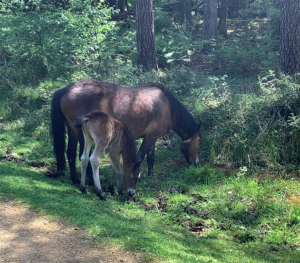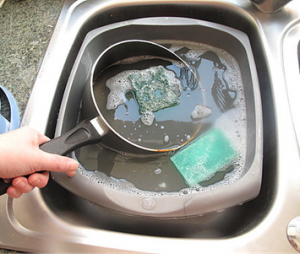Stick to the Pitch: five ways to protect freshwater wildlife when camping
18th October 2022
Through its Wilder for Water campaign, Freshwater Habitats Trust is urging visitors to the New Forest to camp responsibly to protect the Forest’s internationally-significant freshwaters.
If you’re camping in the New Forest, freshwater wildlife may not be your first consideration. However, from sundews to Southern Damselflies, the New Forest wetland landscape is bursting with rare, freshwater plants and animals. In fact, water is everywhere in the Forest. With more than 1,000 ponds and pools, this clean freshwater network provides habitats which have been lost from much of lowland England.

A huge assortment of wildlife and livestock depends on the fresh, clean water the New Forest holds for feeding, drinking, and inhabiting. Traditional grazing has been practiced in the New Forest for hundreds of years and aids the balance between species, helping maintain the biodiversity.
Together, clean water and traditional grazing mean that you can find some of the wetland wonders just a stone’s throw away from the New Forest car parks and campsites. You don’t need to go far to hear the call of a wading bird or spot a real gem of a plant. Even ditches and puddles can hold incredible rarities that have long disappeared from other areas of the British countryside.
The beautiful landscape of the New Forest National Park attracts visitors from all over the UK and beyond. There are more than 100 campsites to choose from across the National Park, so there is something to suit everyone. With more than 6,000 camping pitch spaces, the Forest offers an opportunity to have a ‘close up’ experience with the landscape in which we ‘pitch up’.
-
Find a suitable campsite
The Forest is a sensitive, fragile place that needs to be treated with care, so when planning your camping trip heed the advice from Forestry England, National Park Authority, Freshwater Habitats Trust, and other organisations. Together, we stand against wild camping, which is not permitted in the New Forest.
Wild camping and overnight parking are dealt with swiftly by a team of dedicated Rangers and Keepers to ensure the Forest is left undisturbed. So, book into a campsite and find accommodation that is suitable for your needs.
-
Use designated disposal points for blackwater
Blackwater or foul waste is the most damaging type of wastewater. That’s why it’s the most important to dispose of correctly at chemical disposal points found in campsites. Not all campsites have toilets, so make sure to check before you book to ensure you can deal with you waste needs without impacting on the environment.
-
Dispose of greywater responsibly

Greywater is wastewater from washing up, showering and hand washing. It contains high levels of pollutants, including nitrates and phosphates. These nutrients can cause algae to build up and suffocate aquatic insects and fish.
To conserve the New Forest’s rare freshwater plants and animals, all greywater should be taken to the campsite’s disposal location. If you are in a motorhome, make sure grey water is not discharged directly to ground and instead is collected and disposed of at a nearby facility.
-
Treat tap and bottled water like greywater
Tap water is chemically different from rainwater and from the water that is found in New Forest wetlands. Although it is not harmful to us, tap and bottled water can have a negative impact on plants as they have adapted over thousands of years to clean, unpolluted water. In the fragile environment of the New Forest it is therefore important to dispose of unwanted tap and bottled water in the same way as greywater.
-
Protect freshwater habitats throughout your camping holiday
The New Forest is an amazing place with an abundance of special wildlife. This makes it the perfect place for a camping holiday. Throughout your trip, follow the New Forest Water Code and take small steps to protect water quality:
- Only flush the 3Ps –pee, poo and paper. Never flush wet wipes and sanitary products down the loo.
- Never pour fats and oils down the sink
- Always take your rubbish away with you.*
- Always bag and bin your dog’s poo -any bin will do!*
- Never pour waste liquids or throw litter down surface water drains
In partnership with the New Forest National Park Authority and funded by the Green Recovery Challenge Fund and Environment Agency, Our project, Wilder for Water, works with visitors, organisations and businesses to raise awareness of the special qualities of the New Forest waterscape. As co-hosts of the New Forest catchment, we’re promoting a best practice ‘clean water standard’ for camping and recreation across the National Park and beyond.
